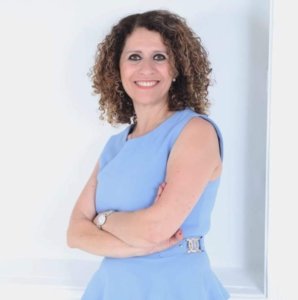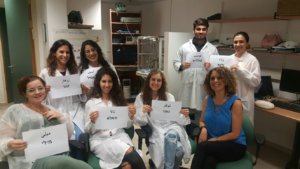
BSF Board of Governors – Prof. Mouna Maroun
Meet Prof. Mouna Maroun, a woman of many firsts

Being the first of anything takes grit and determination, and Prof. Mouna Maroun knows this well. She was the first from her hometown (Isfiya) to earn a PhD, the first Arab to have a PhD in Neuroscience and the first Arab woman to head a university science department in Israel (at the University of Haifa, the same college where she earned her PhD in biological psychology.)
To her already expansive resume, she now adds a new title, as she recently became a member of BSF’s Board of Governors. It is a position she accepts with enthusiasm. A past recipient of two BSF grants, she credits BSF not only with helping to advance her career as one of Israel’s most respected neurobiologists, but also with opening doors to successful partnerships with U.S. scientists.
“If you study science in Israel, you know that a BSF grant is very prestigious,” she said. “Ask Israelis about international partners they want to work with, and most of them will tell you they want to work with partners in the United States.”
That was certainly the case with Maroun. The way she tells it, she did her postdoc research in Paris. She loved the city but felt that she missed the opportunity of not coming to the United States for that training. She says her eventual BSF partnerships helped rectify that.
“The BSF grants meant that I finally had connections to American scientific research,” she said.
Maroun is a member of the Sagol Department of Neurobiology at the University of Haifa. Her pioneering research focuses on how the brain regulates emotions under normal and pathological conditions. In her lab, she addresses the interaction between the amygdala and the medial prefrontal cortex in fear regulation. She also studies the effects of environmental challenges – such as trauma or a steady diet of fatty food — on emotions, social behavior and memory. Her research on childhood trauma, which involves studying animal models, has led to new insights on the need to exclusively design treatments for children and adolescents.
In the wake of the coronavirus pandemic, she is looking into possible connections between obesity and COVID-19. She is curious about any connections between the pandemic and weight gain. During previous pandemics, it was more common for people to lose weight.
“Now it is different, and that’s not good,” she said. “People still need to be careful about what they eat, especially children that have the brains and critical neural circuits under ongoing maturation and are susceptible to the adverse effects of diet. Thus, my advice is they need to be as active as they can be while staying safe.”
Maroun is as a member of the Israel Council for Higher Education’s Planning and Budgeting Committee. She also chairs the council’s steering committee on access to higher education for Arab students in Israel.

Maroun is considered a role model for young women, and for Arab students of both genders in Israel. She works hard to expand professional opportunities of neuroscience scholars from underrepresented minority groups. For her, access to education is very personal.
“My grandfather immigrated (to Israel) from Lebanon, and my family was not rich by any means,” she said. “From the time I was little, I knew that if I was ever really going to make something of myself, I was going to have to study very hard. I am an Arab, a Christian, a Maronite, and a woman. I don’t know what it feels like to be in a majority. But I was determined to make a difference, and so were others in my family from my generation. In my family, there are now three professors, 20 lawyers and five doctors!”
As a BOG member, she will give her fellow BSF Board members insight on how to strengthen awareness of BSF among Arab students who are interested in pursuing careers in science.
“As an Arab in Israel I believe that science can bridge people together through the passion for knowledge,” she said. “Science gives equal opportunities regardless of political opinions and conflicts.”
When she’s not being a scientist, she can usually be found glued to her smartphone. “It’s mainly because when I find something that interests me, I want to find out more,” she said, laughing. “If I was not a scientist, I think I would like to be in the CIA.”
